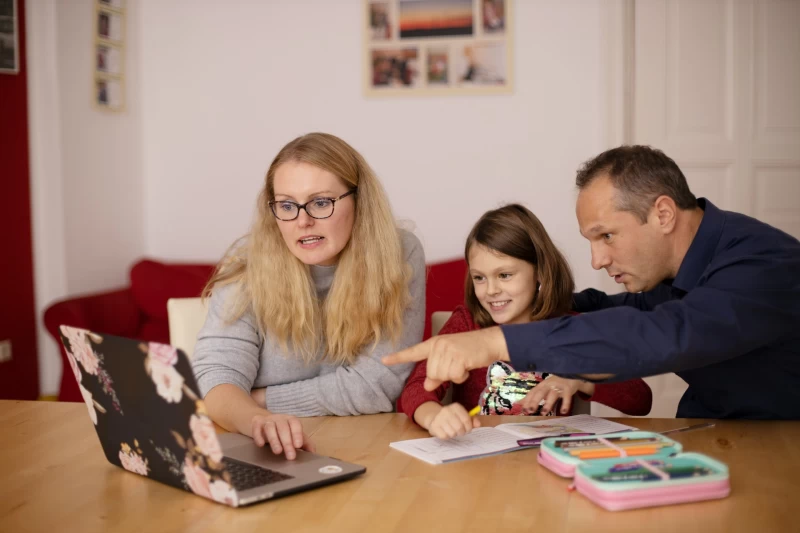9 disadvantages and benefits of online learning

By Jeremy Kwok
Online learning (also known as remote learning or distance learning) has been around for many years, but the pandemic brought this alternative schooling option into the spotlight. Emerging technology (including accessible, high-speed satellite internet) has made online learning a viable choice for many Australian families, particularly in remote locations.
What is online learning?
Online learning is different to home schooling, in which parents have full responsibility for their child’s learning. Online learning students are enrolled in a class like they would be at a regular school, except that they learn from home. The school provides qualified teachers and learning resources, and the student is supervised by a parent or other responsible adult. The teacher takes responsibility for planning, supporting and assessing the students’ learning.
All Australian states have government distance education schools. Queensland, New South Wales, Victoria, Western Australia and Tasmania also have non-government distance education schools, as you can see in the list below.
Understanding more about online learning, or distance education, can help you decide if it’s a good fit for your child. Here are nine online learning benefits and disadvantages.
Five online learning benefits
Flexibility
Online learning students can access their coursework from anywhere with an internet connection at a time that suits them. This degree of flexibility enables students to complete their schooling at their own pace, while fitting it around other commitments. This makes online learning ideal for students participating in:
traineeships
part-time work
elite-level training.
It also suits families who are travelling. Australian Christian College Online student and Junior Pro World Champion Wakeboarder Mikayo Mundy says, ‘The thing I like about online schooling the most is I can do it anywhere at my own pace — and then I can go and train… It’s just awesome!’
A high degree of flexibility can also work well for children with disability by allowing families to schedule learning around things like regular breaks and medical appointments.
Personalised learning
In addition to personal support from teachers, online learning students get individual attention from their parent or supervisor. There is a strong focus on each student’s learning needs, which can enhance engagement and academic performance. A Rockhampton-based online student, Naomi, says, ‘Via traditional schooling, you feel like you’re wasting so much time because students are interrupting you and the teacher… It’s generally not focused. Now I can work at my own pace through online education. I can customise my day to suit my academic strengths and weaknesses.’ 
Broad range of courses
Distance education schools can often provide access to a wide range of subjects, allowing students to pursue their interests and explore different topics. A distance education student, Sarah, says, ‘[I spend] every minute doing the things I love, so everyday I am one step closer to reaching my goals.’
Enhanced technological skills
While learning online, distance education students naturally develop technological skills. The ability to conduct online research, use digital tools and collaborate via online platforms is highly valued by employers and can support students in their future endeavours. Sarah says, ‘If I don’t understand something, I just pause, re-wind and watch it again. Simple!’
Safe learning environment
The home environment can be a safe, secure space for students who have experienced bullying, stigma or harassment. Distance education provides an opportunity for students to learn without judgment or discrimination. Physical separation from bullies and threatening situations can ease the stress associated with traditional school settings, allowing students to focus on their studies while receiving support that’s tailored to their needs. ‘Both my girls are dyslexic and we needed an alternative to standard schooling,’ Roz, a distance education mother from Western Australia, says. ‘They weren’t surviving.’
‘As soon as we started online schooling, we have gone leaps and bounds in their achievement, confidence and happiness.’ 
Four disadvantages of online learning
Limited social interaction
Online learning students don’t have the face-to-face peer interaction associated with a traditional classroom or the sense of community that can come with attending a physical school. However, online learning schools address this by providing access to electronic learning platforms and virtual classrooms to facilitate group projects and personal interactions. Many online learning students also participate in sporting and community activities where they make friends and develop social skills.
Self-motivation
Without the daily structure and accountability of a traditional classroom, some students may find it hard to stay motivated. For students struggling with self-discipline, the support and guidance of their supervisor plays a vital role in ensuring success.
Loss of income
A parent (or another responsible adult) needs to be around to supervise the student. If this parent was working, this would mean an income loss. However, online learning is often considerably more affordable than other forms of private education such as boarding school. It’s important to weigh up these aspects and consider your personal financial situation.
Technology dependence
Distance education relies on technologies including the internet, computers and software applications. This may pose a problem:
in areas with limited connectivity
if your access to reliable technology is limited.
Recently, there has been a rapid improvement in the speed, stability and cost of satellite internet (for example, with providers such as Starlink entering the market), making online study much easier for remote students.
Is distance education right for my child?
Distance education can be a suitable option for your child, depending on their individual needs and circumstances. Before switching your child to distance education, there are several matters to consider.
Your child’s success in current school setting
Firstly, if your child is thriving in their current school environment, it might be unwise to change. However, children struggle in traditional schools for a variety of reasons, and many students benefit from the shift to distance education due to the increased flexibility, safe home environment and individualised support provided.
Parents’ time and work commitments
Secondly, government legislation requires that distance education students are monitored by an on-site supervisor. This is typically one of the parents. While you are not the teacher, you will be responsible for supervision of your child’s learning. Are you able to supervise your child’s learning during school hours? 
Subsequently, freeing one parent to supervise your child will mean you must survive without a double income. There are other ways to generate additional household income, but this should be factored into your planning. The upside is that distance education fees are much lower than traditional private school fees.
Adequate learning space and technology
Thirdly, you will need to consider whether you can create an appropriate learning space before undertaking distance education. An open, well-lit, quiet space is required for learning. Headphones can be useful in some instances.
Next, when you’re completing distance education, technology becomes a critical tool in facilitating learning, and so your home will need fast, reliable wi-fi. Distance education students spend at least a few hours per day on the internet. If you’re unsure how fast and reliable your internet connection is, you might need to contact an IT professional.
Exposure to social environments
Lastly, without physically attending school, students can feel isolated. For this reason, it is important to engage your child in social settings outside the home with other children. If this is not possible, we suggest you keep your child in a traditional school environment.
Distance education in Australia offers a comprehensive curriculum delivered primarily online, enabling students to study at their own pace and location. It is particularly beneficial for students who require flexibility due to:
medical conditions
travel commitments, or
other personal circumstances.
Additionally, distance education allows students to develop important skills such as self-discipline, time management and independent learning, which are valuable for future academic and professional endeavours.
However, it is important to consider factors such as your child's learning preferences, level of self-motivation and the availability of necessary technological resources before deciding if distance education is the right fit for them.
Distance education can be a great option for students who thrive in a flexible and individualised learning environment, but it's not for everyone.
A list of online schools in Australia
New South Wales
State schools | Non-government schools |
| The distance education program provides access to full-time education to students from pre-school to Year 12 who are unable to attend school regularly due to special circumstances or live in isolated areas. These programs are delivered by a network of education centres and schools, which can be found on the NSW Public Schools website. | Australian Christian College — Marsden Park |
Queensland
State schools | Non-government schools |
| Brisbane School of Distance Education | Australian Christian College — Moreton |
| Cairns School of Distance Education | Charlotte Mason College |
| Capricornia (Emerald Campus) School of Distance Education | Faith Christian School |
| Charleville School of Distance Education | Groves Christian College |
| Charters Towers School of Distance Education | Jubilee Christian College |
| Longreach School of Distance Education | Riverside Christian College |
| Mount Isa School of the Air |
Victoria
State schools | Non-government schools |
Distance Education Centre Victoria (DECV) | Australian Christian College — Victoria Online |
| Virtual School Victoria | |
| Haileybury |
Western Australia
State schools | Non-government schools |
Schools of Isolated and Distance Educated (SIDE) | Australian Christian College - Southlands |
Swan Christian College |
Tasmania
State schools | Non-government schools |
Tasmanian eSchool | Australian Christian College — Launceston |
Australian Capital Territory
Queanbeyan Primary School DEC |
Karabar High School DEC |
South Australia
South Australian students who are unable to attend a local school or access particular studies at their school may be able to complete their schooling externally. More info can be found on the Government of South Australia website.



